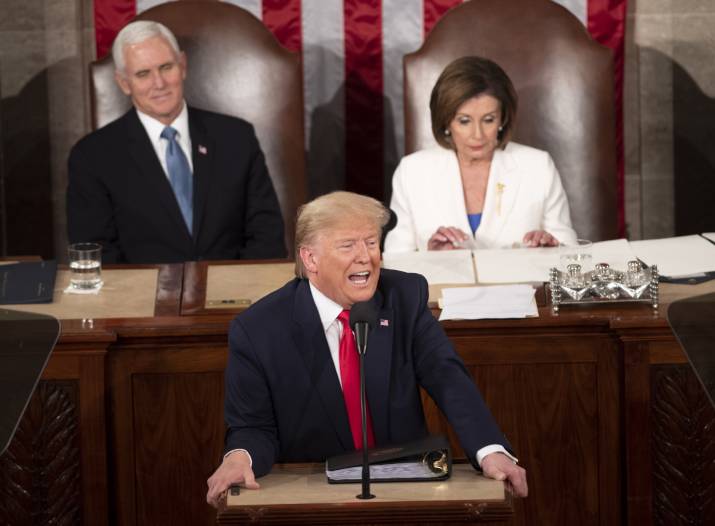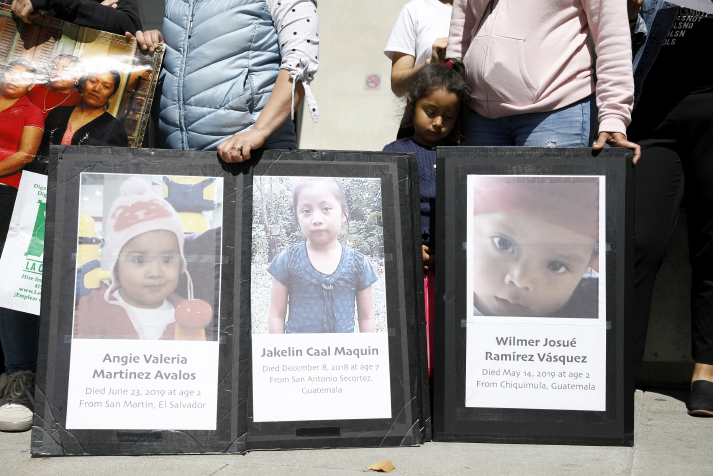| Opinion |
| State of Disunion | |
| Trump's official address shows an active-passive strategy | |
|
|
 U.S. President Donald Trump delivers his State of the Union address to a joint session of Congress on Capitol Hill in Washington, D.C. on February 4 (XINHUA)
Trump officially announced his candidacy in Pennsylvania on March 10, 2019, with the campaign slogan Keep America Great, a modification of his first election slogan. In the same way, his 2020 election manifesto doesn't have any major surprises, continuing and re-emphasizing his 2016 program. As the last address before the presidential campaign, the main theme of the State of the Union was trumpeting what he deems the achievements of his term and reiterating his political beliefs. Tooting his own horn Trump bragged about the U.S. economy being "the best it's ever been" and the U.S. being stronger than at any other time in history, with more job opportunities, bigger incomes and a booming stock market. Poverty and the crime rate have been reduced, while people's confidence has surged. He attributed this progress to his tax reduction strategy, financial deregulation, the policy to make the U.S. energy independent and judicial reform. He also boasted about his perceived achievements in reshaping foreign relations and advancing social reforms. For example, the trilateral North American Free Trade Agreement was replaced by the entirely new U.S.-Canada-Mexico Agreement. Then there were tariff wars with major trading partners. The phase-one trade deal signed with China, which eased the hostility to some extent, was also trotted out as an achievement, along with enhanced investment in the military and making NATO allies increase their defense budget. One relatively innocuous achievement was reforming the public education system by establishing the Opportunity Scholarship covering chosen college students' tuition, fees and campus expenses. Trump praised his administration's progress in medical care, illegal immigration and the building of a wall on the U.S.-Mexico border. Defeating the Islamic State radical group and the raid on its leader Abu Bakr al-Baghdadi that led to his death, the assassination of Iranian General Qassem Soleimani and controlling opioid drug abuse were other achievements. Some of them were promises Trump had made during the 2016 presidential campaign and have been high on his agenda over the past three years. Lack of rivals Trump admittedly has several advantages over other candidates, such as solid fundamentals, a basically good economy and the absence of a good candidate from the Democratic Party. Still he is not taking the election lightly. His address made two priorities clear: winning more votes and creating a historical legacy. His address also outlined the key tasks his administration will carry out if he wins a second term. It will reconstruct domestic infrastructure, upgrade Internet services and deport illegal immigrants with criminal records. Politically, his Middle East peace plan will be implemented, the country will be protected from the threat of terrorism and troops will be withdrawn from the Middle East and Afghanistan. Some of these plans were made in 2016 but were delayed or scrapped after the Democrats blocked some or money was not approved. Unsurprisingly, in the nearly 80-minute speech, Trump made no mention of his impeachment trial, perhaps a pointed demonstration that his opponents can't distract him. While many applauded the address, Nancy Pelosi, the Democratic Speaker of the House of Representatives, tore her copy of it right after the speech. Such acts by the opposition have become normal in the U.S. and the polarization will impact Trump's political agenda in varying degrees. However, instead of attacks and an impeachment process that couldn't unseat him but just made him the first impeached president seeking reelection in U.S. history, Democrats should concentrate on choosing an appropriate candidate and coming up with an attractive campaign platform. Otherwise, they will not have an effective strategy to return to the White House even after 2024. Whether Trump wins the election will largely hinge on the economic trends in the U.S. in 2021, the reason his address highlighted the economic performance under his administration. Although the economic statistics sound good, there is still the grim reality of mounting debt, serious stock market bubbles and lackluster performance in the manufacturing sector. Economists and international economic organizations continue to warn the U.S. and the global economy of the risk of recession.  People participate in a demonstration in San Francisco on July 19, 2019, for the protection of immigrants' rights (XINHUA)
Confused diplomacy Foreign affairs were not a focus of the address, nor will they be unless the external environment changes drastically. Trump bypassed the Korean Peninsula nuclear issue and the negotiations with the Democratic People's Republic of Korea (DPRK), though it was a priority in his Asia-Pacific agenda after he took office. He was immensely proud to be the first U.S. president to ever meet with a DPRK leader. The omission could indicate that bilateral negotiations have reached an impasse. There seems to be an irreconcilable contradiction between the DPRK's position that it has the right to take effective self-defense measures and that sanctions should be removed and the U.S. line that the DPRK should abandon its missile and nuclear weapons program. This makes it unlikely that Trump will boast about U.S.-DPRK negotiations before the election. Instead, he focused on the Iranian issue, with the general idea of tightening economic sanctions and maintaining maximum pressure. Through such measures, the U.S. intends to trigger internal changes in Iran rather than resort to military force against the Iranian Government. After Trump was elected, the U.S. foreign strategy refocused on major country competition, positioning China and Russia as its main competitors. It also began withdrawing from international treaties to shirk its responsibilities and used maximum pressure to resolve regional hotspot issues. However, maximum pressure often proved to be ineffective in the face of the complicated international situation with major changes in power structures. U.S. relations with Russia have been deteriorating while a trade truce has been reached with China after intermittent friction. Besides the phase-one trade deal with China, Trump mentioned bilateral cooperation with the Chinese Government to combat the novel coronavirus. Because of these two developments, the Trump administration seems to have lost its reasons to restart the trade conflict and pressure China to enter a second stage of trade negotiations. It remains to be seen what implications this adjustment in the U.S. policy on China in Trump's remaining first term will be. Sino-U.S. relations have entered a period of strategic competition and bilateral communication and accommodation have continued despite multiple problems. The two countries have been testing each other's limit. The U.S. strategic contraction will be a long-term process and international chaos and fragmentation will continue to intensify. Against this backdrop, Trump, while lacking strategic planning, has continued attacking specific issues but in a disorganized way. This seemingly active but actually passive diplomatic style is likely to continue. The author is an op-ed contributor to Beijing Review and a researcher with the Pangoal Institution Copyedited by Sudeshna Sarkar Comments to yanwei@bjreview.com |
|
||||||||||||||||||||||||||||
|
